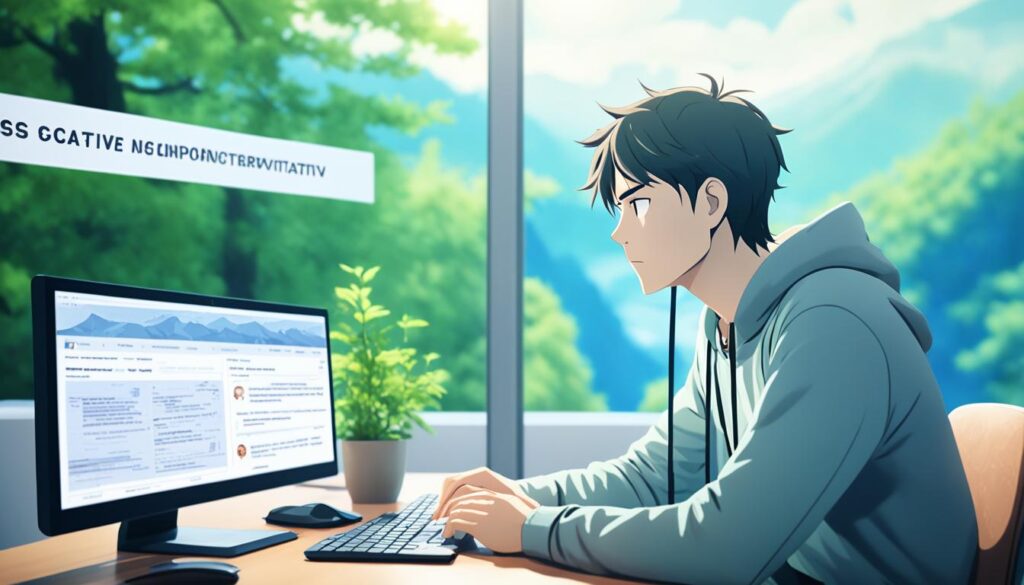Overcome Online Negativity: Embrace Peace of Mind
“Don’t let negativity rent space in your head. Raise the rent and kick it out.”
Welcome to the digital age, where we connect, create, and share like never before. But, with freedom comes negativity. Online, we face dislikes, negative comments, and the need to manage our reputation. But, there’s a way to deal with this without losing our peace.
This article will show us how to beat online negativity. We’ll learn to stay positive online and be true to ourselves. By finding peace, we can handle online negativity and make a supportive online space for everyone.
So, let’s start and see how we can beat the noise. We’ll keep our minds healthy and do well online.
Key Takeaways:
- Online negativity can hurt our peace and well-being.
- By finding peace, we can deal with online negativity without getting affected.
- Having a positive online presence helps us manage our reputation.
- Being true to ourselves and building a supportive community fights negativity.
- Being kind, focusing on the positive, and empathizing helps beat online negativity.
Understanding the Impact of Online Negativity
Online negativity can really hurt our mental health and how we see ourselves. Learning to deal with mean comments online is key. It’s important to know how online hate affects us.
Getting dislikes or mean comments online can make us feel bad. It’s normal to feel less good about ourselves when others criticize us. But, remember, online hate doesn’t truly show our worth or who we are.
We need to learn to not let others’ opinions define our self-worth. Sometimes, mean comments come from jealousy or frustration in others. Knowing this helps us see that their words say more about them, not us.
To boost our self-esteem online, we must be strong and stay positive. Focus on the good things about us and our wins, not the bad comments. Setting realistic goals for ourselves helps us handle online criticism better.
When facing online negativity, having a supportive online circle is key. Find people who lift us up, not bring us down. Talk positively with others and make friends who share our interests. This helps fight off the bad vibes from online hate.
Self-esteem isn’t just about what others think of us. It’s about how we value ourselves on the inside. By understanding online negativity and how to deal with it, we can keep our minds healthy and feel better about ourselves online.
Recognizing the Sources of Online Negativity
Dealing with online criticism is tough. It’s key to know where the negativity comes from. This helps you handle it better and stay positive.
Trolls: Trolls love to upset people online. They use mean words to get a reaction. Remember, they don’t want real feedback. They just want to cause trouble.
Competitors: In competitive fields, rivals might try to hurt each other’s reputation. They might spread lies or bad reviews. Knowing this helps you stay calm and focus on being the best.
Personal Acquaintances: Sometimes, friends or people you know can be mean online. Jealousy or misunderstandings can lead to bad comments. It’s key to talk things out and clear up any issues.
Knowing where online negativity comes from helps you tell real criticism from mean comments. Not all feedback is worth your time. Pay attention to the good stuff and ignore the bad.
Now, let’s look at how to tell good feedback from bad. It’s important to know the difference.
Evaluating the Validity of Online Feedback
When we’re online, we often face negative feedback. It’s key to handle it well to keep our self-esteem up. Not all feedback is the same. Knowing what’s good and what’s not is vital for feeling good about ourselves.
Start by keeping an open mind when you get feedback. Some criticism can help us grow. But, don’t let mean comments bring you down. We must decide what feedback is worth listening to.
Look at who gave the feedback. Is it from someone you trust? Or is it from an unknown person? Feedback from unknown people might not be true. They might just want to hurt you.
Check what the feedback says too. Is it clear and helpful? Or is it just mean? Good feedback tells you how to get better. Bad feedback just tries to hurt you.
Also, think about the feedback you get overall. Is the bad feedback the only thing people say? If most people like your work, don’t worry about the bad comments. But if many people say the same thing, maybe you should think about it.
It’s also key to trust yourself. You know your work best. Learn to tell good feedback from bad. Good feedback helps you grow. Bad feedback is just mean.
To deal with online feedback, find a balance. Use the good feedback to get better. But ignore the bad stuff. By doing this, you can feel better online and be more confident in yourself.
Practicing Emotional Resilience
Building emotional resilience helps us handle online reputation and stay positive. It gives us the strength to deal with negative comments online. By being resilient, we keep our minds healthy when facing online challenges.
Keeping a support system is key. Being around real friends and positive groups online helps a lot. Talking to others who understand us can give us new ways to cope.
“Having a support system in place not only provides emotional support, but it also reminds us that we are not alone in our experiences. By connecting with others who understand our struggles, we can find solace, encouragement, and helpful advice.”
Self-care is also vital for emotional resilience. Taking care of our body, feelings, and mind keeps us strong and positive. Doing things we love and relaxing with meditation or deep breathing can reduce stress and make us more resilient.
Techniques for Developing Emotional Resilience:
- Positive self-talk: Tell yourself good things about your strengths and what you’ve done.
- Refocusing: Think about the good parts of your life and your goals.
- Reframing: Change negative thoughts to more positive and empowering ones.
- Acceptance: Know not everyone will agree or be kind online. It’s okay and out of your control.
Building emotional resilience takes time and effort. But with regular work, it changes how we handle our online reputation. By taking care of our mental health and staying positive, we can face online interactions with confidence.

Cultivating a Supportive Online Community
Building a supportive online community helps a lot when dealing with online criticism. Being around people who support you makes you stronger. They help you ignore the bad stuff.
Join groups that match your interests or goals. Talk a lot, share your stories, and help others. This way, you’ll feel like you belong and make friends who get you.
Starting your own group is also a good idea. This could be a blog, a social media page, or a forum. It’s a place where you can meet others who share your interests.
But it’s not just about getting support. Give it back by cheering others on and listening to them. Helping others makes your community happier.
“Surround yourself with only people who are going to lift you higher.” – Oprah Winfrey
Choose carefully who you follow online. Don’t waste time on negative people. Follow those who make you feel good and teach you new things.
Building a strong online community takes time and effort. It’s like building a house, it takes patience. Keep being true to yourself and take care of your friends.
| Tips for Cultivating a Supportive Online Community | |
|---|---|
| 1. Join online communities or groups that align with your interests or goals. | |
| 2. Engage actively in discussions, share your experiences, and offer support to others. | |
| 3. Start your own online community, such as a blog or social media page. | |
| 4. Be a positive force in others’ lives by uplifting and celebrating their successes. | |
| 5. Curate your online community by unfollowing or muting accounts that spread negativity. | |
| 6. Follow accounts that inspire, motivate, and educate. | |
| 7. Be patient, consistent, and nurturing in building your digital support system. |
Safeguarding Your Mental Well-being
As we use the internet, taking care of our minds is key. It’s vital to stay positive online and boost our self-esteem. Here are ways to keep your mind healthy:
- Set Boundaries: Make clear rules about how much time you spend online and what you look at. Avoiding negative stuff helps keep you safe.
- Take Social Media Breaks: Sometimes, step back from social media. Seeing others’ perfect lives can make you feel bad. Use this time for things that make you happy and care for yourself.
- Practice Self-care: Do things that make you feel good about yourself. This might be working out, meditating, being thankful, or having fun hobbies. Taking care of yourself in real life helps your online life too.
- Cultivate a Supportive Network: Be around people who lift you up and make you feel good. Join online groups that spread kindness and support.
- Foster Healthy Relationships: Think about the friends you make online. Make sure they are true friends who respect and support you. Being with people who like and value you makes you feel better about yourself.
Using these tips, you can be positive online and feel better about yourself. Always remember, your mental health is the most important thing, both online and off.
| Self-Care Activities | Benefits |
|---|---|
| Exercise | Increases endorphin levels and boosts mood |
| Meditation | Reduces stress and promotes relaxation |
| Practicing Gratitude | Enhances positive mindset and optimism |
| Pursuing Hobbies | Increases sense of fulfillment and joy |
Reframing Negative Comments as Opportunities
When we face online criticism, it’s key to see negative comments as chances to grow. Instead of seeing them as attacks, we can view them as ways to learn and improve. This helps us make positive changes.
Depersonalizing negative feedback:
It’s helpful to not take negative feedback personally. Remember, it often comes from people who are unknown and have their own views. Seeing it as a chance to learn helps us stay calm and look at it objectively.
Extracting valuable insights:
Every negative comment has something useful to teach us. By looking closely at the feedback, we can find patterns and areas to get better. This helps us understand what our audience wants and how we can serve them better.
“Criticism, like rain, should be gentle enough to nourish growth without destroying roots.” – Frank A. Clark
Responding with humility and grace:
Answering negative feedback with kindness can turn bad situations into chances to show great customer service. By listening and offering solutions, we show we care about fixing problems. We also show we’re open to learning and improving.
To show how this works, let’s look at an example:
| Feedback | Reframing Opportunity |
|---|---|
| “Your product is terrible!” | Thank you for your feedback. We appreciate your input and are constantly working to improve our product. Could you provide specific details about your experience so we can better understand and address the issue? |
| “Your website is confusing and hard to navigate.” | We apologize for the inconvenience you experienced. We value your feedback and will take it into consideration as we strive to enhance the user experience. If you have any specific suggestions or areas of concern, we would love to hear them. |
| “Your customer service is slow and unhelpful.” | Thank you for bringing this to our attention. We apologize for any inconvenience caused. We are dedicated to providing excellent customer service and would appreciate the opportunity to rectify the situation. Please reach out to us directly so we can assist you promptly. |
By seeing negative comments as chances to grow, we can get better and improve. Remember, facing challenges and getting feedback helps us aim higher and do more than we thought possible.
Practicing Empathy and Kindness Online
In today’s world, managing your online reputation is key. Social media means you’ll often see criticism. Instead of getting mad or arguing, try being kind and understanding.
When someone criticizes you online, think about why they might be upset. They might be mad or sad for good reasons. Being kind can change a bad situation into a good one.
Every comment comes from a real person facing their own problems. Try to see things from their side. Be kind in your replies, either in private or public. Saying sorry or explaining yourself can help calm things down and fix relationships.
Practicing Empathy and Kindness Online: Tips and Strategies
- Put yourself in their shoes: Imagine how you’d feel in their place. This helps you understand their feelings better.
- Respond calmly and respectfully: Don’t get mad or attack back. Be kind and respectful, even if they’re not. This shows you’re a grown-up.
- Offer solutions or assistance: If you can, give helpful advice or links. Showing you care and want to help is great.
- Engage in constructive dialogue: Encourage respectful talks instead of just saying no. This makes the online world better for everyone.
- Learn from the feedback: Bad comments can teach you something new. Use this chance to get better.
Being kind and understanding online helps you deal with criticism and builds a good online name. Treating others well makes for better conversations and more friends online.

Keeping a good online reputation takes work. It’s hard to be kind when people are mean, but it’s worth it. Being kind helps you handle online problems with love and makes the internet a nicer place.
Focusing on the Positive
In today’s digital age, it’s easy to get caught up in negative online experiences. But, by focusing on the positive, we can change our online interactions. This makes our online time uplifting and empowering. It also helps us feel better about ourselves and live happier.
One way to stay positive is by practicing gratitude. Take a moment each day to think about what you’re thankful for. It could be a supportive online group, meeting new people, or your own wins. Saying thanks helps us see the good in our online lives.
It’s also good to celebrate our wins, big or small. Sharing our successes online boosts our self-esteem. It shows us we’re worth celebrating and encourages others to do the same. This creates a positive vibe in our online circles.
Surrounding ourselves with positive people online is key. Being around those who lift us up changes how we see things and feels good for our well-being. Joining groups that support and uplift each other helps us grow and stay positive together.
When we face negative comments online, we can change how we see them. Instead of letting criticism get us down, see it as a chance to get better. Using feedback to improve ourselves turns negativity into a drive for growth.
Lastly, taking care of ourselves online is vital. Sometimes, we need to step away from social media and do things that make us happy. It’s okay to focus on our happiness, not just what others think of us.
By choosing positivity, we boost our self-esteem and make the online world a better place. Let’s focus on the good and make a positive impact online.
Seeking Professional Support if Necessary
Managing online reputation and dealing with social media criticism can be hard. Sometimes, the negativity online can feel too much. In these cases, getting help from a professional is a smart move for your mental health.
Talking to a therapist or counselor can be a safe way to deal with your feelings. They can help you understand and work through your emotions about online negativity. You’ll learn new ways to cope and become more emotionally strong.
Professional help can also teach you to see online criticism in a better way. Therapists can help you see negative comments as chances to learn and improve. They can also help you set limits, manage your expectations, and stay true to yourself online.
Remember, asking for help is not a sign of weakness. It shows you care about your mental health. Taking care of your mind helps you handle online challenges better.
Looking after your mental health is key to staying balanced online and offline. If you’re feeling overwhelmed, talk to a trusted therapist or counselor. They can offer the support and advice you need to deal with online reputation issues.
Maintaining Consistency and Authenticity
In today’s digital world, it’s key to handle online criticism and keep a good online image. Keeping true to yourself and your values builds trust with your followers. It also helps you deal with negative comments well.
When facing online criticism, it’s important to be consistent with what you say. Being steady with your message makes your brand clear and recognizable. If you change your views often, you might get more criticism. But, sticking to your beliefs strengthens your reputation and your place in your field.
Being real and open is also key to a good online image. Being honest and clear in how you talk and what you share builds trust with your audience. People like to support real people or brands. By being open and sharing your stories, you make your online presence more real and touching.
“Consistency establishes a clear and recognizable brand image.”
Dealing with online criticism is normal in today’s digital world. Instead of getting upset by negative comments, see them as chances to get better. Good criticism can give you useful advice and help you know what your audience wants and expects.
To keep being consistent and real, make sure your online self matches your real self. Don’t pretend to be someone you’re not. Being inconsistent can make people not trust you and hurt your online image.
Being real with your audience is a great way to show you’re authentic. Answering comments and messages kindly shows you care about what they think. It also builds a strong community around your brand.
Consistency and Authenticity Checklist
- Develop a clear brand message and consistently communicate it across all your online platforms.
- Show vulnerability and share stories that reflect your authentic self.
- Respond to comments and messages in a respectful and empathetic manner.
- Avoid creating a persona that deviates significantly from your true self.
- Use negative feedback as an opportunity for growth and improvement.
By being consistent and real, you can build a strong online reputation that can handle criticism. Embrace what makes you different and let it show in your online world.

Developing a Positive Mindset
Having a positive mindset helps beat negative feedback and boost self-esteem online. It means being proactive against negativity and being strong when criticized. By changing negative thoughts to positive ones, people can feel more confident and strong online.
One good way to be positive is to fight self-doubt and bad self-talk. This means questioning negative thoughts and thinking more positive things. Focusing on the good in yourself and your growth can make you feel better about yourself.
“I firmly believe that we have the power to shape our own narratives online. By consciously choosing to focus on the positive, we can overcome negative feedback and cultivate a strong sense of self-worth.”
– Sarah Thompson, Digital Influencer
It’s also key to be kind to yourself and take care of your mind and feelings. This helps keep a positive outlook and bounce back from hard times. Doing things you love, being mindful, and getting support from friends and family helps a lot.
Having a supportive online group also helps. Being around people who are positive and inspiring makes you feel good. Connecting with others who have been through tough times can give you the support and motivation you need.
Remember, tough times and negative feedback can help you grow. Seeing negative comments as a chance to learn can make you better. Having a growth mindset means you keep getting better, which makes you stronger online.
Techniques for Developing a Positive Mindset:
- Challenge negative self-talk: Question the validity of negative thoughts and replace them with positive affirmations.
- Cultivate self-compassion: Practice self-care and engage in activities that bring joy and fulfillment.
- Build a supportive online community: Surround yourself with like-minded individuals who uplift and inspire.
- Reframe negative comments: View criticism as an opportunity for growth and learning.
In conclusion, having a positive mindset is key to beating negative feedback and feeling good online. By fighting self-doubt, believing in yourself, and having a supportive group, you can be confident and strong online.
| Benefits of Developing a Positive Mindset | Techniques to Cultivate a Positive Mindset |
|---|---|
| A more resilient mindset when faced with negativity. | Challenge negative self-talk |
| Increased self-esteem and self-worth. | Cultivate self-compassion |
| Improved mental and emotional well-being. | Build a supportive online community |
| Opportunity for personal growth and learning. | Reframe negative comments |
Conclusion
In this article, I shared tips on not worrying about online dislikes and negative comments. We learned how online negativity affects us and where it comes from. We also learned to check if the feedback is true.
Being strong emotionally and having a supportive online group helps us stay happy. Seeing negative comments as chances to grow and being kind online makes things better.
Staying positive and getting help when we need it keeps us real online. Having a positive outlook helps us beat online negativity and find peace.
We have the power to ignore online dislikes and negative comments. Let’s help ourselves and others make the online world kinder and more supportive.







